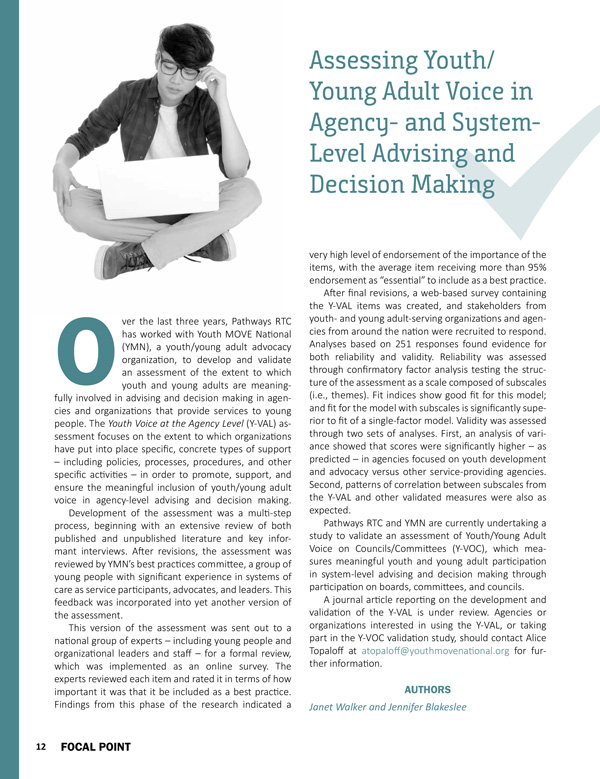
Abstract: This article describes the work done by Pathways and Youth MOVE National (YMN) to develop and validate the Youth Voice at the Agency Level (Y-VAL) assessement, designed to help organizations and agencies that provide services to young people assess the extent to which youth and young adults are meaningfully involved in advising and decision making.
"Assessing Youth/Young Adult Voice in Agency- and System-Level Advising and Decision Making" (2018)
By Janet Walker, Caitlin Baird, & Mary Beth Welch
Over the last three years, Pathways RTC has worked with Youth MOVE National (YMN), a youth/young adult advocacy organization, to develop and validate an assessment of the extent to which youth and young adults are meaningfully involved in advising and decision making in agencies and organizations that provide services to young people. The Youth Voice at the Agency Level (Y-VAL) assessment focuses on the extent to which organizations have put into place specific, concrete types of support – including policies, processes, procedures, and other specific activities – in order to promote, support, and ensure the meaningful inclusion of youth/young adult voice in agency-level advising and decision making.
Development of the assessment was a multi-step process, beginning with an extensive review of both published and unpublished literature and key informant interviews. After revisions, the assessment was reviewed by YMN’s best practices committee, a group of young people with significant experience in systems of care as service participants, advocates, and leaders. This feedback was incorporated into yet another version of the assessment.
This version of the assessment was sent out to a national group of experts – including young people and organizational leaders and staff – for a formal review, which was implemented as an online survey. The experts reviewed each item and rated it in terms of how important it was that it be included as a best practice. Findings from this phase of the research indicated a very high level of endorsement of the importance of the items, with the average item receiving more than 95% endorsement as “essential” to include as a best practice.
After final revisions, a web-based survey containing the Y-VAL items was created, and stakeholders from youth- and young adult-serving organizations and agencies from around the nation were recruited to respond. Analyses based on 251 responses found evidence for both reliability and validity. Reliability was assessed through confirmatory factor analysis testing the structure of the assessment as a scale composed of subscales (i.e., themes). Fit indices show good fit for this model; and fit for the model with subscales is significantly superior to fit of a single-factor model. Validity was assessed through two sets of analyses. First, an analysis of variance showed that scores were significantly higher – as predicted – in agencies focused on youth development and advocacy versus other service-providing agencies. Second, patterns of correlation between subscales from the Y-VAL and other validated measures were also as expected.
Pathways RTC and YMN are currently undertaking a study to validate an assessment of Youth/Young Adult Voice on Councils/Committees (Y-VOC), which measures meaningful youth and young adult participation in system-level advising and decision making through participation on boards, committees, and councils.
A journal article reporting on the development and validation of the Y-VAL is under review. Agencies or organizations interested in using the Y-VAL, or taking part in the Y-VOC validation study, should contact Alice Topaloff at atopaloff@youthmovenational.org for further information.
Suggested Citation
Walker, J., & Blakeslee, J. (2018). Assessing Youth/Young Adult Voice in Agency- and System-Level Advising and Decision Making. Focal Point: Youth, Young Adults, and Mental Health, 32, 12. Portland, OR: Research and Training Center for Pathways to Positive Futures, Portland State University.